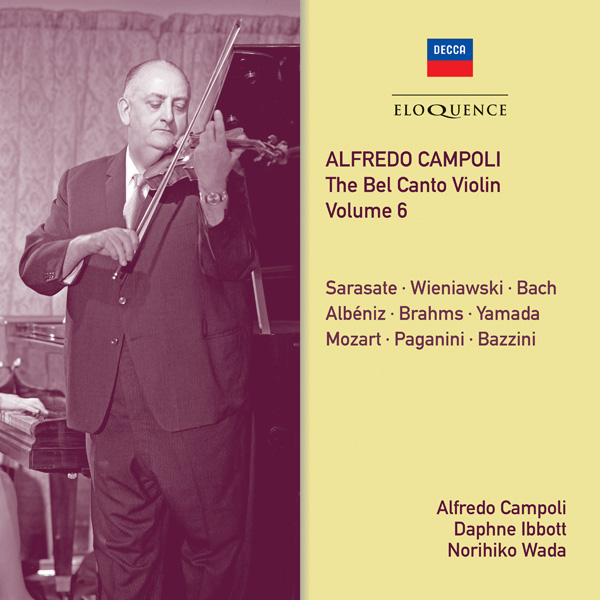One of the most significant violinists in gramophone history, Alfredo Campoli enjoyed tremendous success in the 1930s as a purveyor of light music both in concerts with his own salon orchestra and on Decca. A series of six, 2CD reissues from Eloquence focuses on the violinist’s postwar reinvention of himself as ‘Campoli’, the classical soloist.
The sixth volume of ‘The Bel Canto Violin’ gives a first international CD release on Decca to the violinist’s final recording for the label after half a century of best-selling albums. This features the music of the Polish violinist-composer, Henryk Wieniawski whose star has fallen since the passing of Romantic-style violinists such as Campoli. Almost 72 years old when he made this record for L’Oiseau-Lyre in August 1978 but often practising for seven hours a day, he could still turn on the charm for a wistful tone-poem such as the ‘Légende’, wear the grand manner in showpieces such as the ‘Souvenir de Moscou’ and present transcendent virtuosity in the’ Polonaise brillante’.
This collection opens with another L’Oiseau-Lyre album made late in his long career and of another violinist-composer, Pablo de Sarasate. This offers not the usual run of ‘Carmen Fantasy’ and ‘Zigeunerweisen’ but the once fashionable set of eight ‘Danzas españolas’. Like Sarasate and Wieniawski, Campoli recognised no boundary between high and popular art: ‘Although I enjoy doing the lighter stuff,’ he told Gramophone in 1939, ‘my heart and soul are in the music of the finer type. I am convinced that one can make a success of both.’
So he did; the third album reissued here, is a Decca recital of encores, recorded while Campoli was touring Japan in July 1966, after three months performing across Australia. Thus, alongside display items such as Bazzini’s ‘Ronde des Lutins’ – dispatched with inimitable finesse – there are two arrangements of Japanese folksongs, ‘Red Dragonfly’ and ‘The Rain on Jogashima’.
All the recordings in this series of ‘Alfredo Campoli: The Bel Canto Violin’ have been given new remasterings from original Decca sources. Invaluable context on both artist and repertoire is provided by new booklet essays from Campoli’s biographer David Tunley.
CD 1
PABLO DE SARASATE:
Eight Danzas Españolas
Navarra for two violins, Op. 33 (Belinda Bunt, violin II)
ISAAC ALBENIZ: Tango (arr. Dushkin)
JOHANNES BRAHMS: Waltz in A flat major, Op. 39 No. 15
JOHANN SEBASTIAN BACH: Arioso (from Harpsichord Concerto, BWV 1056, arr. Franco)
FRANZ SCHUBERT: Ave Maria
KOSAKU YAMADA:
Akatonbo (Red dragonfly) (arr. Campoli)
Jogashima no ame (The Rain on Jogashima) (arr. Campoli)
CD 2
WOLFGANG AMADEUS MOZART: Rondo (Allegro) (from ‘Haffner’ Serenade, arr. Kreisler)
NICCOLA PAGANINI:
La Campanella, Op. 7 (arr. Kreisler)*
Caprice in B flat major, Op. 1 No. 13 (arr. Kreisler)*
Caprice in D major, Op. 1 No. 20 (arr. Kreisler)*
ANTONIO BAZZINI La Ronde des Lutins: scherzo fantastique, Op. 25*
HENRYK WIENIAWSKI:
Polonaise No. 1 in D major, Op. 4*
Légende, Op. 17*
Mazurka, Op. 19 No. 1: Obertass*
Mazurka, Op. 19 No. 2: Dudziarz*
Souvenir de Moscou, Op. 6*
Scherzo-Tarantelle, Op. 16
Romance (from Violin Concerto No. 2) *
Capriccio-Valse, Op. 7*
Polonaise brillante, Op. 21*
Alfredo Campoli, violin
Daphne Ibbott, piano (CD1: 1–9, CD2: 6–14)
Norihiko Wada, piano (CD1: 10–15, CD2: 1–5)
*FIRST INTERNATIONAL CD RELEASE ON DECCA
Recording Producers: Peter Wadland (Sarasate, Wieniawski); unidentified (Encores: CD1: 10–15, CD2: 1–5)
Balance Engineers: John Dunkerley (Sarasate, Wieniawski); unidentified (Encores: CD1: 10–15, CD2: 1–5)
Recording Locations: Rosslyn Hill Chapel, London, UK, 8–9 November 1976 (Sarasate), 9–11 August 1978 (Wieniawski); Japan, c.1966 (Encores: CD1: 10–15, CD2: 1–5)
Remastering Engineer: Paschal Byrne
Original LP Releases: L’Oiseau-Lyre DSLO 22 (Sarasate); Decca ‘Eclipse’ ECS 639 (Campoli Encores); L’Oiseau-Lyre DSLO 45 (Wieniawski)
‘Campoli, who is excellently recorded, is on precisely the right wavelength, leaving us in no doubt of how difficult these works are to play and yet, paradoxically, making it all sound easy.’ Gramophone (Sarasate)
‘Campoli understands the gypsy style to the manner born and his timbre is sweet, his intonation true. He is not the man for unrestrained hyperbole, yet the moto perpetuos are effortless.’ Gramophone (Sarasate)
‘There is no need to make allowances for the ravages of time; if indeed there are any ravages they have not reached the fingers or the bow or the intonation, all of which give the impression that playing Wieniawski is the easiest thing in the world. The lyrical sections of the music go warm-heartedly, the virtuoso sections go elegantly; nowhere are standards less than the very best.’ Gramophone (Wieniawski)

